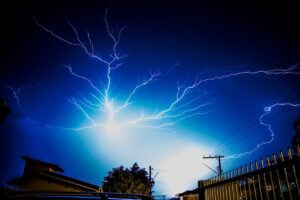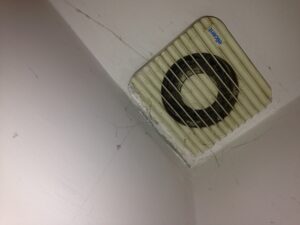Despite your best efforts, there may be electrical hazards lurking just below the surface. Unsure what those might be? That’s okay! We’ve got a list of electrical hazards below, broken down for your convenience. Consider reading this list your home-related work for the week, so you can cut yourself some slack in the dishes department.
Lightbulbs
Whether it’s white light or fluorescent blue, your light bulbs must be the correct wattage for the fixture in which they rest. If the bulb you are using provides more wattage than what is recommended for the fixture, overheating and a possible electrical fire can occur. Just. Say. No.
Lights That Flicker and Cause a Tripped Circuit Breaker
Flickering lights can be caused by loose wiring splices or a light fixture that is simply broken and needs a replacement. To fix this, turn off power to the light and look at the fixture as well as the wiring that supplies electricity to it. Replace wire connectors with strong and sturdy ones and if the fixture itself is the issue, get rid of it and replace it with something new.
Your breaker is always tripping.
Occasionally, your breaker is going to trip. Sometimes, you are going to blow a fuse. But this isn’t something that should happen on a regular basis.
Loose Switches or Receptacles
If you have noticed that electrical switches in your home are loose or the device is not mounted properly to the electrical box, this could be a big fire hazard. To fix it, turn off the power, remove the faceplate of the switch and tighten any screws that are loose. Sometimes, you may need to shorten screws with a special electrician multi-tool. This tool will strip and bend the wire and allow you to cut screws. Reinstall the device and make sure that the connections are tightened.
Extension Cords
Modern households are full of extension cords to help us power all of our appliances and gadgets. While these cords do their thing, be sure to keep them out of heavily-trafficked areas and make sure they are free from cracks and other damage, all of which could – you guessed it – cause a fire.
Also, consider your wiring options before leaping right to an extension cord. If you can plug directly into an outlet, do so. One way to thin out your use of extension cords is to prioritize your gadgets. If you aren’t using your PlayStation daily, consider unplugging it to leave space for another item.
Old Wiring
Older homes have character and unique charm. Unfortunately, the electrical system in an older home is not safe. Old or damaged wiring can cause deadly electrical fires. So, if you live in an older home, you should have a professional electrician inspect the wiring closely.
If the home is between 30 and 60 years old (or older), you may need to have the home completely re-wired – especially if the wiring is aluminum-based. If your home has copper wiring, this is safer and less prone to fires, but it should still be examined to ensure it’s operating as it should.
Smell of Burning Plastic or Vinyl
The strange smell of burning plastic or vinyl is unpleasant and hard to miss. It’s a surefire sign your electric wiring is getting too hot and needs to be looked at by an electrician. Ignoring this sign is just asking for a house fire.
Sparks
It goes without saying, the electrical wiring in your home should never spark. This is also a sign there is a short or the wiring is getting too hot. It’s another problem that may lead to a house fire if you opt to ignore it and hope it goes away on its own.
Your Outlets Are Buzzing, Get Warm, or Don’t Work
If any of your household outlets don’t work, your wiring may be faulty. The same goes for outlets that are buzzing or unusually warm. If you have an outlet that is warm to the touch, this could be a sign that something is wrong with the wiring or that there is too large of an electrical load on that outlet. Contact a professional electrician if any of these issues are coming up in your home.
Wobbly Ceiling Fans
This may not seem like an obvious fire hazard, but if the fan is out of balance or wobbly, it could cause an electrical issue. Check for loose, damaged, or missing hardware on the fan and head to your local hardware store to grab parts and install them. Or, if the fan is really old, it’s probably a good idea to just replace it with something new.
Appliances
If your appliances are not plugged into ground fault circuit interruptor (GFCI) outlets, contact an electrician immediately. These types of outlets work to stop circuits that are overloaded, before they cause electrical fires.
Consider your habits surrounding appliances, large and small. Are your appliances (including hair dryers and toasters) plugged in even when they are not in use? Stop that and unplug them. These tools are silently pulling electricity and could be an electrical hazard if they come into contact with water.
Finally, if any of your appliances produce a shock when you touch them, make sure that you contact a repair specialist to check it for issues. In the meantime, keep your and your family’s hands away from the appliance in question.
Here at Prairie Electric, we are 100% invested in your safety and comfort. Take a few minutes to review these safety tips and save yourself the danger and stress of a home fire.


